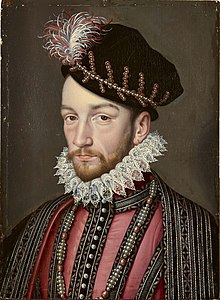
Back Carlos IX de Francia AN شارل التاسع ملك فرنسا Arabic شارل التاسع ملك فرنسا ARZ Charles IX (gazik ke Franca) AVK IX Karl Azerbaijani دوققوزونجو شارل AZB Карл IX Валуа Byelorussian Шарл IX (Франция) Bulgarian Charlez IX (Bro-C'hall) Breton Karlo IX, kralj Francuske BS
| Charles IX | |||||
|---|---|---|---|---|---|
 Portrait, c. 1572 | |||||
| King of France | |||||
| Reign | 5 December 1560 – 30 May 1574 | ||||
| Coronation | 15 May 1561 | ||||
| Predecessor | Francis II | ||||
| Successor | Henry III | ||||
| Regent | Catherine de' Medici (1560–1563) | ||||
| Born | Charles, Duke of Angoulême 27 June 1550 Saint-Germain-en-Laye, France | ||||
| Died | 30 May 1574 (aged 23) Vincennes, France | ||||
| Burial | 13 July 1574 Basilica of St Denis, France | ||||
| Spouse | |||||
| Issue | |||||
| |||||
| House | Valois-Angoulême | ||||
| Father | Henry II of France | ||||
| Mother | Catherine de' Medici | ||||
| Religion | Catholicism | ||||
| Signature |  | ||||
Charles IX (Charles Maximilien; 27 June 1550 – 30 May 1574) was King of France from 1560 until his death in 1574. He ascended the French throne upon the death of his brother Francis II in 1560, and as such was the penultimate monarch of the House of Valois.
Charles' reign saw the culmination of decades of tension between Protestants and Catholics. Civil and religious war broke out between the two parties after the massacre of Vassy in 1562. In 1572, following several unsuccessful attempts at brokering peace, Charles arranged the marriage of his sister Margaret to Henry of Navarre, a major Protestant nobleman in the line of succession to the French throne, in a last desperate bid to reconcile his people. Facing popular hostility against this policy of appeasement and at the instigation of his mother Catherine de' Medici, Charles oversaw the massacre of numerous Huguenot leaders who gathered in Paris for the royal wedding, though his direct involvement is still debated. This event, known as the St. Bartholomew's Day massacre, was a significant blow to the Huguenot movement, and religious civil warfare soon began anew. Charles sought to take advantage of the disarray of the Huguenots by ordering the siege of La Rochelle, but was unable to take the Protestant stronghold.
Many of Charles' decisions were influenced by his mother, a fervent Roman Catholic who initially supported a policy of relative religious tolerance. After the events of the St. Bartholomew's Day Massacre, he began to support the persecution of Huguenots. However, the incident haunted Charles for the rest of his life, and historians suspect that it caused his physical and mental health to deteriorate over the next two years. Charles died of tuberculosis in 1574 without legitimate male issue, and was succeeded by his brother Henry III, whose own death in 1589 without issue allowed for the ascension of Henry of Navarre to the French throne as Henry IV, establishing the House of Bourbon as the new French royal dynasty.